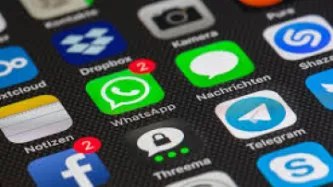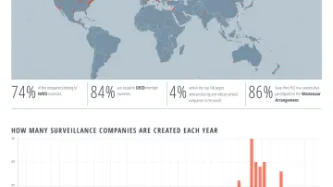Search
Content type: Examples
Following a complaint from the Association for Civil Rights in Israel, the country's attorney general has said the Shin Bet security agency's use of mobile phone tracking technology to monitor and threaten Palestinian protesters at Jerusalem's Al Aqsa Mosque in May 2021 was a legitimate security tool, Josef Federman reports at ABC News. Shin Bet sent a text message to both Palestinian residents of east Jerusalem and Palestinian citizens of Israel who were determined to be in the area of the…
Content type: Examples
Just as China uses technology system called "Integrated Joint Operations Platform" to control and surveil the persecuted population of Uighurs while restricting their movement and branding dissent as "terrorism", the Israeli military is using facial recognition and a massive database of personal information to control millions of Palestinians in the occupied West Bank. In November 2021, NSO Group's Pegasus spyware was found on the phones of six Palestinian human rights activists, three of whom…
Content type: Examples
The Israeli minister of public security has joined police in denying claims in an article in Calcalist that the country's police force have used NSO Group's Pegasus software to spy on the phones of people who led protests against former premier Benjamin Netanyahu. Calcalist reported that the surveillance was carried out without court supervision or oversight of how the data was used. The daily Haaretz newspaper also reported that it had seen a 2013 invoice in which NSO billed police @@2.7…
Content type: Examples
On March 17th, the Israeli Knesset (Parliament) approved a bill allowing the digital tracking of people arriving from abroad and who would have to go into quarantine. Travellers will be tracked using digital tracking bracelets, or other means like cell phone bracelet. According to Haaretz, Deputy Health Minister Yoav Kisch said 5,000 digital bracelets will be available for use the same week, and that 30,000 more will be acquired over the next three months.
Content type: Examples
Israel’s initial success in curbing the spread of the coronavirus in April was followed in June by a surge in cases that government advisers blamed on insufficient resources for ministries to implement an effective trace-and-trace programme and increase testing to the level that would show clearly where cases were appearing so outbreak could be suppressed quickly. Among the problems is the decision to use security service Shin Bet’s recently disclosed database of mobile phone location data to…
Content type: Examples
The Israeli smart digital ID card and border control software company Pangea hopes its new biometric smart card could help airports reopen. The company claims governments, many of which are working on defining the medical tests and processes required for eligibility, can use the card to verify that the holder is virus-free or has immunity. The card incorporates a photo, digital signature, chip, hologram, and up-to-date encrypted data on the holder’s COVID-19 profile, and can be securely linked…
Content type: Examples
The Israeli digital ID card creator Pangea EVP has developed an immunity passport intended to give individuals access to public spaces, including airports. The passport will include a photo of the holder, a digital signature, a hologram, and a chip. When they want to fly, holders will insert flight and medical details into a web portal; the system will then advise the health protocol they need to follow. If they test negative for COVID-19, the laboratory will issue a smart card that…
Content type: Examples
On June 24, Israeli ministers reversed a previous decision and unanimously decided to support controversial legislation allowing the Israeli security service Shin Bet to track civilians’ phones to help curb the spread of the coronavirus after a new spike in infections. On June 30 the Knesset Foreign Affairs and Defence Committee voted to advance the legislation, which must go on to pass its second and third readings. The legislation is designated as “temporary” and will last until July 22 while…
Content type: Examples
An Israeli government panel tasked with managing the coronavirus crisis green-lighted a bill that would write into law the government’s authority to impose emergency regulations and froze a bill that would allow the Shin Bet security agency to track confirmed and suspected coronavirus patients. The latter move may end the Israeli government’s use of the secret service’s capabilities for combatting the pandemic. Shin Bet’s head, Nadav Argaman, reportedly told ministers that his defence agency…
Content type: Examples
At a press conference, Israeli prime minister Benjamin Netanyahu suggested that microchipping everyone, beginning with children returning to school and kindergarten as the coronavirus lockdown ends; the chip would sound an alarm whenever anyone gets too close much as a car does. Security experts immediately objected on the grounds that microchipping kids was neither legal nor practical, that the children would be at risk from paedophiles if their data leaked to the internet; and that the real…
Content type: Examples
The UK government, in collaboration with universities, water companies, and public research bodies, is preparing to launch a national research programme to develop an early warning system for future waves of COVID-19 by detecting the coronavirus in sewage. About half of those infected with SARS-CoV-2 excrete it in their faeces, and enough virus survive to be detectable in untreated water using ultrasensitive PCR analysis. Teams in the UK, several other European countries, Australia, Israel, and…
Content type: Examples
A parliamentary panel granted Israel's Shin Bet security service an additional three weeks to use mobile phone data to track people infected with the coronavirus; prime minister Benjamin Netanyahu had requested a six-week extension while his government drafts legislation to regulate the data use in line with requirements imposed by the Israeli Supreme Court. Testimony given to the parliament's intelligence subcommittee showed that the Shin Bet surveillance was the reason it was possible to…
Content type: Examples
Citing privacy concerns, the Knesset’s Foreign Affairs and Defence Committee voted to block the Israeli government’s request for an extension to police powers to requisition mobile phone roaming data relating to those ordered to quarantine for enforcement purposes.
Access had been granted for a month, and was due to expire. In the month the police had access, they conducted around 500 random mobile phone location checks per day, drawn from a list of 13,500 people provided by the Health…
Content type: Examples
The Israeli company Cellebrite, best known for providing hacking software to help law enforcement agencies get inside suspects' iPhones, is now pitching its technology to help authorities pull the location data and contacts off the phones of newly-diagnosed COVID-19 patients in order to "quarantine the right people", as the company emailed to the Delhi police force.
Cellebrite is one of at least eight surveillance and cyber-intelligence companies that are attempting to repurpose their…
Content type: Long Read
UPDATE 21/07/2020: On Monday July 20th, the Israeli parliament approved a new bill allowing the Ministry of Health to rely again on the Intelligence Services to track people who may have been exposed to Covid 19 when the number of new cases reaches 200 and above per day. The authorisation is then granted for three weeks and can be extended if the numbers have not decreased. The new law will be effective until January 2021. As of July 21st and for at least the next three weeks, the Intelligence…
Content type: Examples
Thousands of Israelis have been ordered into quarantine without any right of appeal based on cellphone tracking that may be wrong because phone geolocation is insufficiently fine-grained to tell the difference between two people being in the same room and being separated by a door when dropping off and receiving a food delivery. Numerous agencies are performing the kind of tracking formerly carried out only by the domestic security agency, Shin Bet. Among them are Shin Bet itself, which is…
Content type: Examples
While the agency that manages residence permits, the Coordination of Government Activities in the Territories, is closed, Israel has instructed Palestinians seeking to verify whether their permits to remain in Israel are still valid to download the app Al Munasiq, which grants the military access to their cellphone data. The app would allow the army to track the Palestinians' cellphone location, as well as access their notifications, downloaded and saved files, and the device's camera. …
Content type: Examples
Israel intends to deploy a cellphone tracking system developed in Taiwan by Chunghwa Telecom, which launched it on February 1 in Taiwan, where it was used to track the subscribers of Taiwan's five network operators. To begin, Taiwan's Centers for Disease Control compiled a list of people who need to be placed in quarantine or home isolation after coming into close contact with COVID-19 patients or travellers returning from high-risk countries. After local health and civil affairs departments…
Content type: Examples
The Israeli defense minister, Naftali Bennett, has published a plan under which civilian companies including the controversial company NSO Group would cooperate with the defence establishment to fight the novel coronavirus after a sharp rise in reported cases indicated that existing methods of contact tracing and geolocation were no longer effective at tracing all the people a patient might have infected. Under Bennett's proposal, the collaborators would build a system into which the…
Content type: Examples
The Israeli Ministry of Health's mobile app, "The Shield", is intended to alert users if they have been at a location in Israel at the same time as a known COVID-19 patient.
The app, which is available for both Android and iOS, works by collecting the GPS and WiFi network (SSID) information of a user's mobile device throughout the day. This data is saved only on the mobile device and is not transmitted to the Ministry of Health, other government agencies, or any organisation. The locations…
Content type: Examples
In response to a case brought by the Legal Center for Arab Minority Rights in Israel (Adalah), the Arab Joint List, and the Association for Civil Rights in Israel, the Israeli Supreme Court issued a temporary injunction on March 19 limiting the the state's and the Shin Bet security service's use of cellphone surveillance, among others, to track and monitor COVID-19 patients and trace their contacts. The court indicated it will ban the programme unless a parliament oversight committee is…
Content type: Examples
The Israeli prime minister, Benjamin Netanyahu, has authorised the country's internal security agency to use a previously secret tranche of mobile phone geolocation data, gathered to combat terrorism, to retrace the movements of individuals with confirmed cases of the coronavirus and identify people they've interacted with who should be quarantined. After Parliament's Secret Services Subcommittee ended its discussions without approving the measure, Netanyahu said the government would approve…
Content type: Examples
The Israeli compnay NSO Group, best known for the spyware it sells governments and has been used to target journalists and advocates, says it has developed a product aimed at analysing data to map people’s movements to identify who they’ve come in contact with, which can then be used to stop the spread of infection. About a dozen countries are reportedly testing the NSO technology, which takes two weeks' worth of mobile phone tracking information from the infected person, which it then matches…
Content type: Examples
Ministers have permitted the Shin Bet security service to "use the cellular phone data of carriers of the disease to retrace their steps and identify anyone they may have infected", and will relay the information to the Health Ministry, which will send a message to those who were within two meters (6.6 feet) of the infected person for 10 minutes or more, telling them to go into quarantine. An update to the original order has extended the period during which it is in force from 30 days until the…
Content type: Examples
Facebook has taken down 65 accounts, 161 pages, dozens of groups and four Instagram accounts, which were ran by Archimedes Group, an Israeli political consulting and lobbying firm that aimed at disrupting elections in various countries.
Archimedes was mostly active in Sub-Saharan Africa but also some part of Southeast Asia and Latin America. According to Facebook, the accounts taken down were attempting to influence people in Nigeria, Senegal, Togo, Angola, Niger and Tunisia. But the most…
Content type: News & Analysis
Privacy International welcomes WhatsApp's immediate reaction after the revelation that Israeli cyber intelligence company NSO group had exploited a vulnerability in their software. We encourage all WhatsApp users to update their app as soon as possible. However, we believe WhatsApp needs to be much more transparent with their users. We haven't seen a notification on the app itself that would inform users about both, the bug, and the fix. The current version merely states that you can now see…
Content type: Examples
In Israel, the National Insurance Institutes sends out anti-fraud officers to spy on benefits claimants. Among the cases reported, a woman had her benefits allowances halved after a man entered her house pretending to be interested in buying the flat next door. The man, who was in fact a NII employee, discretely took picture of the woman to argue she was not actually severely disabled. The woman was eventually able to regain her full allowance.
The growing number of controversial cases of…
Content type: Examples
In Israel, the National Insurance Institute – in charge of granting benefits – eventually dropped a tender that had caused outrage in the country after being uncovered by Haaretz and Channel 13. The tender revealed the NII was trying to collect online data about benefits claimants – including from social media – to detect cases of frauds. The tender used wheelchair users as an example, suggesting that finding pictures of alleged wheelchair users using bikes on social media could contribute to…
Content type: Press release
On the five year anniversary of NSA whistleblower Edward Snowden leaking a massive trove of classified information that has since transformed our understanding of government mass surveillance, Dr Gus Hosein, Executive Director of Privacy International said:
“Is it enough for your government to tell you ‘we’re keeping you safe, but we’re not going to tell you how’? Edward Snowden asked himself this profoundly important question five years ago. We’re thankful he did.
His decision to expose the…
Content type: News & Analysis
Privacy International is today proud to release the Surveillance Industry Index (SII), the world's largest publicly available educational resource of data and documents of its kind on the surveillance industry, and an accompanying report charting the growth of the industry and its current reach.
The SII, which is based on data collected by journalists, activists, and researchers across the world is the product of months of collaboration between Transparency Toolkit and Privacy…



